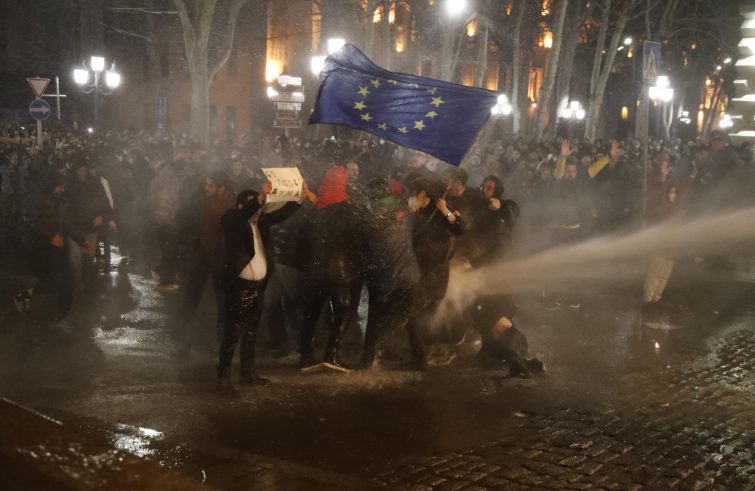
“The protests continue. Even if the government suspends the law and withdraws it, they will continue to protest.” Speaking with SIR, Msgr. Giuseppe Pasotto, Apostolic Administrator of the Caucasus and responsible for the Latin Catholic Church, explains what is happening on the streets of Tbilisi. He reads out the statement which the government has just released announcing its decision to withdraw the so-called “foreign agents” bill. It is a decision of “the responsible government party”, reads the communiqué. The announcement follows two nights of clashes in Tbilisi, where thousands of protesters took to the streets waving the EU’s blue flag and calling for the withdrawal of the bill and a firm commitment from the government to continue pursuing the EU accession process. There were some very tense moments. Protesters even attempted to storm the Parliament building where the bill had passed the first reading.
The images of water cannons fired at protesters made the headlines throughout Europe. The Ministry of the Interior reported that 133 people were arrested by the police, with scores of policemen and civilians wounded.
In the communiqué released this morning – pointed out Msgr. Pasotto – the government reiterated its commitment to ensuring peace and stability in the country, along with its determination to remain steadfast on the path toward Europe “with dignity – which is the party’s primary focus.” “The option for Europe is always there officially,” the bishop explained. “But their actions ultimately take a different direction.” Today, March 9, the demonstration is scheduled to take place at 6 p.m. Thus, despite the announced withdrawal of the bill, opposition parties declared that they will continue with the protests. The mobilization “will not stop until it is officially assured that Georgia is resolutely committed to a pro-Western path,” several opposition parties declared in a joint statement. “Evidently – Pasotto explained – the law was just the last straw for the protest. Moreover, the law lent itself to criticism, were it only because of the wording used in the text, such as the expression ‘foreign agents.’ The impression- and it is not just an impression- is that the government is increasingly distancing itself from Europe and is drawing closer to Russia.” The bill that was withdrawn would have required Georgian organisations receiving more than 20% of their funding from abroad to register as “foreign agents,” with possible restrictions on their activities. Activities of the Churches, Caritas, and NGOs that operate in Georgia but depend on funding from abroad would also have been affected. The Council of Religions likewise addressed the issue a few days ago, voting on a Declaration of Dissent against the bill’s content. “Our problem,” Pasotto explained, “is not whether the bill makes or provides for exceptions to include churches and entities related to religious denominations. Our concern is the very framework of the law, because even if they were to remove churches from the text, it would still undermine the freedom of other groups, of NGOs, accused of being used to create anti-government movements.”
The war in Ukraine makes everything harder. Georgia is situated in a very vulnerable geographic area. With the conflict, many Russians have moved to Georgia. And many Russian companies have likewise decided to relocate their businesses here. However, at the same time, many volunteers from Georgia have joined the fight against Russia.
“The underlying concern that these demonstrations are raising is Europe,” Pasotto insists. “Protesters are making it clear that they want to proceed towards Europe, and not towards Russia. This is the protesters’ plea.”
To that effect, Msgr. Pasotto recalled the European Union’s 11 recommendations towards Georgia’s EU candidacy. But the government has not entirely complied with all of them, especially the one regarding the oligarchs. “There are some points that have intentionally been left unaddressed, and Europe has been rather strict about its demands lately. There is a risk that the government will harden its stance further.” “At that point – Pasotto remarked – we will have to see what happens.
To love Georgia means reaching an understanding to foster its growth, without embarking on the path of conflict. Violence always causes divisiveness and leads nowhere. It destroys; it does not build.”
Msgr. Pasotto reiterated the appeal posted on Facebook by young Catholics from Georgia: “The way in which police officers are treating citizens who freely express their freedom of speech, as enshrined in our country’s legislation, is unacceptable. At the same time, we call on all young people participating in the protests to keep it as peaceful as possible.”









